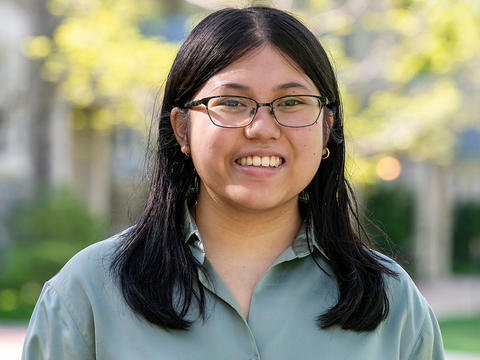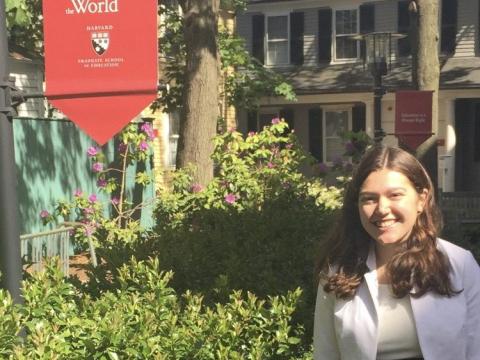
Education and Educational Studies Major, Minor, and Concentration
The Haverford-Bryn Mawr minor in Educational Studies is designed for students interested in exploring teaching and learning. Our vibrant program engages students from a broad range of majors interested in an array of professional pursuits and commitments. Working closely with our talented faculty, they pursue a highly interdisciplinary curriculum that investigates cultural, political, and international dimensions of education as well as the work of facilitating learning in a range of contexts.
At every level, our challenging program links theory with practice. Each of our courses includes a field component in educational settings, from schools to community and senior centers, mental and public health settings, college access and adult learning organizations, and policy/advocacy offices.
Curriculum & Courses
We build our courses as collaborative communities in which our students learn from scholars, their own and field experiences, and each other as they study and learn to facilitate innovative approaches to education. Students emerge from our program inspired and empowered to work towards social change and justice as engaged teachers, passionate learners, curious and committed researchers, and visionary leaders.
We offer two pathways for our minors, one oriented to liberal studies and one culminating in a secondary teaching credential. The Educational Studies minor addresses students interested in the study and practice of education broadly conceived. Students in this minor often pursue graduate study in education or other social sciences; plan to teach at the elementary level or in an independent school; or seek to create a knowledge base for careers in academia, leadership, policy studies, and community development.
Minors in this pathway have significant freedom to design their curriculum and shape field experiences to fit and enlarge their interests. All minors take Critical Issues in Education, our introductory class that examines issues in U.S. education within the framework of educational transformation. Our Field Work Seminar, which brings minors together to reflect on their ongoing fieldwork using the framework of theories of change, is also required. In addition to these two required classes, minors select four education courses, one of which can be taught by faculty in other departments.
Minors planning a career in secondary education enroll in the Secondary Teacher Certification pathway. Our program is accredited to prepare students for certification in biology, chemistry, Earth and Space Sciences, English, mathematics, physics, social studies, and world languages. Students in this minor take Critical Issues in Education, as well as five required education courses. Additional requirements include: completion of a major in the area in which they seek certification, additional course work within the major, English and math courses, and a semester of full-time teaching. Alumni/nae of Haverford and Bryn Mawr Colleges are also eligible to pursue teacher certification through our program as post-bac students at significantly reduced tuition.
Students interested in pursuing a master’s degree in Education and an elementary or secondary teacher certification have the option of sub-matriculating into Penn’s Graduate School of Education.
-
Major Requirements
To satisfy the requirements for the major in Education Studies, students take a minimum of six courses within the Education Department: an approved entry-point course, four 200-level courses, and one 300-level capstone course. In addition, a maximum of five allied courses from outside of the Education Department are required, for a total of 11 major credits.
Community-engaged learning through placements/partnerships/field work is also a central requirement of the major. Thinking with and learning from this work is a strand of Education Studies woven throughout coursework and highlighted in the capstone process.
Below is a list of requirements for the major. Consult the Student Guidebook for depiction of possible pathways through the major.
11 Total Credits, consisting of:
- Minimum of 6 Education Program courses
- Entry point course
- Elective course 1
- Elective course 2
- Elective course 3
- Elective course 4
- Capstone course
- Maximum of 5 allied or non-program courses
- Allied course 1
- Allied course 2
- Allied course 3
- Allied course 4
- Allied course 5
- Minimum of 6 Education Program courses
-
Minor Requirements
Six credits are required for the minor in Education Studies without certification:
- 1 "exploratory entry point" course
- 4 200-level education courses, from which:
- At least two must be offered by Education Program faculty
- Up to two may be offered by faculty in other departments, pending submission of the petition form and approval from major/minor advisor.
- One may be taken at Swarthmore, Penn, or while studying away.
- 1 300-level capstone course, selected from the following:
- EDUC 311: Theories of Change in Educational Institutions
- EDUC 301: Curriculum and Pedagogy Seminar
- EDUC 310/SOWK 676: Making Space for Learning in Higher Education
Secondary Teacher Certification Path
The Bryn Mawr/Haverford Education Program is accredited by the state of Pennsylvania to prepare undergraduates and alumnae for certification in the following subject areas: English; languages, including French, Latin, and Spanish; mathematics; the sciences, including biology, chemistry, and physics; and social studies. Pursuit of certification in Chinese, German, and Russian is also possible but subject to availability of student teaching placements. Students certified in a language have K-12 certification.
To qualify for a teaching certificate, students must complete an academic major in the subject area in which they seek certification (or, in the case of social studies, students must major in history, political science, economics, anthropology, sociology, or Growth and Structure of Cities and take courses outside their major in the other areas). Within their major, students must select courses that help them meet the state standards for teachers in that subject area. Students must also complete the secondary teacher certification track of the minor in education, taking these courses:
Course List Code Title Credits EDUC B200/H200 Community Learning Collaborative: Practicing Partnership 1.0 PSYC B203 Educational Psychology 1.0 EDUC B210/H210 Perspectives on Special Education 1.0 EDUC H275 Emergent Multilingual Learners in U.S. Schools 1.0 EDUC H301 Curriculum and Pedagogy Seminar 1 1.0 EDUC B302
& EDUC B303
and Practice Teaching in Secondary Schools 23.00 - 1
(fall semester, prior to student teaching)
- 2
These courses are taken concurrently for three credits.
Students preparing for certification must also take two courses in English and two courses in math, maintain a grade point average of 3.0 or higher, and pass a series of exams for beginning teachers (state requirements). To be admitted to the culminating student teaching phase of the program, students must earn a grade of a 2.7 or higher in both EDUC 200 (Critical Issues in Education) and EDUC 301 (Curriculum and Pedagogy) and be recommended by their major department and the director of the Education Program. To be recommended for certification, students must earn a grade of 2.7 or higher in EDUC 302 (Practice Teaching Seminar) and a grade of Satisfactory in EDUC 303 (Practice Teaching).
Note: Students practice-teach full time for 12 weeks in a local school during the spring semester of their senior year. Given this demanding schedule, students are not able to take courses other than the Practice Teaching Seminar and senior seminar for their major.
Graduates may complete the requirements for secondary teacher certification at Bryn Mawr in a post-baccalaureate program.
Title II Reporting
Title II of the High Education Act (HEA) requires that a full teacher preparation report, including the institution’s pass rate on assessments as well as the state’s pass rate, be available to the public on request. Students may request a report from Kelly Gavin Zuckerman at kzuckerman@brynmawr.edu.
-
Concentration Requirements
Students majoring in mathematics or physics at Haverford may declare an Area of Concentration in Educational Studies. For the Concentration, students take four courses in the education program:
- EDUC B200/EDUC H200 (Critical Issues in Education)
- Two education courses (must be courses offered by Education Program or affiliated faculty (A. Cook-Sather/ V. Donnay/D. Flaks/A. Lesnick/K. Rho/ C. Wilson-Poe/K. Zuckerman)
- One of the following as a culminating course: EDUC H311 (Theories of Change in Educational Institutions), EDUC H301 (Curriculum and Pedagogy Seminar), SOWK B676 (Making Space for Learning: Pedagogical Planning and Facilitation), or an intensified version of EDUC B295 (Advocating Diversity in Higher Education).
In addition to these education courses, students take two courses in their major field of study. A unit of Independent Study within the major may be used to fulfill this requirement.
Mathematics Majors
To complete the concentration in educational studies, mathematics majors must:
- Earn credit for MATH H460 in two different semesters, one half-credit each; and
- Choose the Mathematics Education option of the senior thesis, as outlined in the Standards for the Mathematics Senior Thesis.
Physics Majors
Students take the following courses:
- PHYS H459, typically in the second semester of the junior year; and
- PHYS H460, typically in the first semester of the senior year.
All senior physics majors prepare and present to the department a talk and paper based on independent work. Education concentrators have the option of choosing a topic related to physics pedagogy for their research.
Associated Programs and Concentrations
Research & Outreach

For her thesis, Antonio examined bilingual community education centers, where teaching and learning transcend the traditional classroom space.

The independent major in Education Studies explored how education has functioned as promise, oppression, hope, and liberation in her own life, which invoked many ideas from scholars who have influenced how she sees education as a tool for liberating practice.

This Bi-Co Education Program course empowers students to explore and enact theories of change and pathways of action in educational institutions and systems by drawing on fieldwork in disciplines from museum studies and social work to art and music.

Rippel hopes to pursue graduate degrees in Public Policy and Law, with an eye toward doing nonprofit work, and community work in communities of color.

The political science major and education minor explored the forces that affect education reform in her thesis.

Education and educational studies minor Mary Cott ’21 is honing her passions for both dance and education by interning with the instructional wings of two New York City-based dance companies.
After Graduation

The anthropology major works with the Asylee Outreach Program to support Philadelphia’s immigrant communities.

The anthropology major and education studies minor is in her first quarter at Stanford University’s Graduate School of Education, where she is pursuing a Ph.D. in education.

The history major and education studies minor is participating in City Year Denver, mentoring, tutoring, and supporting students.

Steliotes will continue her academic journey at the Harvard Graduate School of Education and pursue her dream of becoming a math teacher.

Tsai will be teaching English in Taiwan as the recipient of a Fulbright English Teaching Assistant Grant.

The possibilities Arya found in his own life help him show his inner-city students how to aim high.

Wang is executive director of Mentor for Philly, an organization he co-founded as a student.
Keep Exploring
More Programs
Check out our other academic offerings:
Get in Touch
Join the Mailing List or search for events in your area.
You can find detailed instructions and information on the Application Instructions page. If you need to contact us directly, please send an email to admission@haverford.edu.
Get Social with Haverford